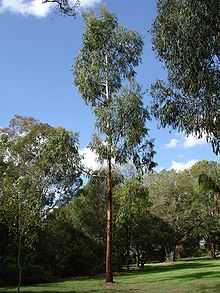Eucalyptus viminalis
| Manna Gum | |
|---|---|
 | |
| Eucalyptus viminalis | |
| Scientific classification | |
| Kingdom: | Plantae |
| (unranked): | Angiosperms |
| (unranked): | Eudicots |
| (unranked): | Rosids |
| Order: | Myrtales |
| Family: | Myrtaceae |
| Genus: | Eucalyptus |
| Species: | E. viminalis |
| Binomial name | |
| Eucalyptus viminalis | |
 | |
| E. viminalis, field distribution | |
Eucalyptus viminalis, Manna Gum, also known as White Gum, Ribbon Gum or Viminalis is an Australian eucalypt.
It is a straight erect tree, often around 40 metres tall, with rough bark on the trunk and base of larger branches, its upper bark peels away in long "ribbons" which can collect on the branches and surrounding ground.[1] Occasionally it can attain very large sizes. The tree with the largest recorded diameter (324.7 cm) is located at Woodbourne in Marlborough, New Zealand.[2]
E. viminalis is widely distributed in the cooler areas of Australia where the leaves are the favoured food of Koalas.[1] Sap has a 5–15% sugar content which makes it an essential part of the energy budget for arboreal or tree dwelling marsupial mammals like Yellow-bellied, Sugar and other gliders. Koalas reintroduced to Kangaroo Island impact on native E. viminalis and is part of a A$4,000,000[3] management project from 2005-9.
There are three subspecies:[4]
- E. viminalis subsp. viminalis - NSW, Victoria, Tasmania, Mount Lofty Range of South Australia
- E. viminalis subsp. cygnetensis - western Victoria, southeastern South Australia
- E. viminalis subsp. pryoriana - southern Victoria
Timber is generally pale pink to pinkish brown in colour, often with distinctive light grey streaks. The attractive light pink tones of this species and its easy workability make it desirable in furniture applications. Structurally, uses are limited due to its low strength and durability, however some is used in seasoned and unseasoned house framing. Sapwood is distinct.
From its geographical distribution, it is not surprising that it is hardy down to −15 degrees Celsius (+5 °F) or more making it suitable for planting in Europe.
See also
References
- ↑ 1.0 1.1 Costermans, L. 2006. Trees of Victoria and adjoining areas 6th ed. ISBN 0-9599105-4-9
- ↑ "Tree Information". The Zealand Tree Register. Retrieved 14 July 2011.
- ↑ South Australian Government Department of Environment and Heritage
- ↑ Brooker, M.I.H., Kleinig, D.A. (2006). Field Guide to Eucalypts, Volume 1 South-eastern Australia. Blooming Books, Melbourne. ISBN 1-876473-52-5